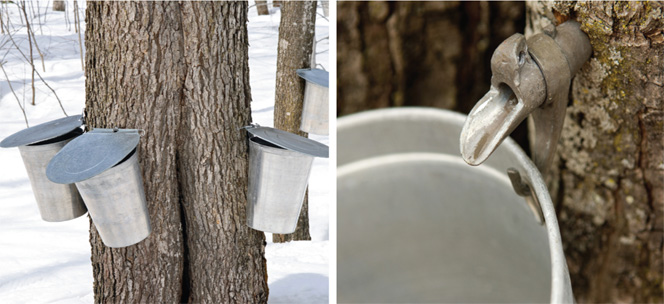Quebec’s maple syrup

Quebec is to maple syrup what the Middle East is to oil: gifted by nature, the province produces more than 70% of the world’s golden liquid and more than 85% of Canada’s.
Unfortunately, as is the case with Middle Eastern oil production, the government is heavily involved in the business through regulations that are intended to “protect” established producers.
Most important is the legal monopoly given to the Fédération des producteurs acéricoles du Québec (FPAQ, the maple syrup producers’ federation). Like the late Canadian Wheat Board, the FPAQ is the sole place where producers are allowed to sell their product in bulk; direct sale to customers (for example at a farmers’ market) is exempted from the rule, although it must still be reported to the FPAQ. If a maple syrup producer dares try to sell in bulk on its own, the FPAQ will level a fine or ultimately seize the product.
As shocking as are these blatant violations of private property rights, they are unfortunately legal. Indeed, the FPAQ was given regulatory powers by the Loi sur la mise en marché, which regulates the selling of (collective) agricultural production. Since the law was adopted in 1990, the FPAQ has adopted some 15 regulations, from compulsory registration to taxes (almost eight cents per pound of syrup).
It also assigned quotas to producers, making the FPAQ a full-fledged cartel, according to economist Sylvain Charlebois. He claims that these quotas exist, just like oil quotas with OPEC, to avoid lower selling prices after a good harvest. Charlebois adds that controlling prices is more important to the FPAQ than innovation and developing new products.
Ontario and New Brunswick have taken advantage of Quebec’s senseless protectionism and stagnation by creating such new and innovative products as maple vinegar, maple ice wine and maple popcorn. Ontario has doubled its maple syrup production since 2006.
Quebec could be at the forefront of innovation too. But first, it needs to get rid of stifling regulations that are choking maple syrup production. Sure, this could mean that some producers will be out of business, but that’s how the market works: only the most competent and innovative ones thrive. Those people are the ones the FPAQ wants to control, since they obviously endanger “the economic, social and moral interests of the 7,400 maple syrup businesses in Quebec.”
However, deregulation will not happen anytime soon. In 2008, all provincial political parties unanimously approved the Pronovost report on agriculture. Most of its recommendations either called for the status quo or for an extension of state intervention.
Adam Smith, who so vehemently opposed production monopolies, would turn in his grave.